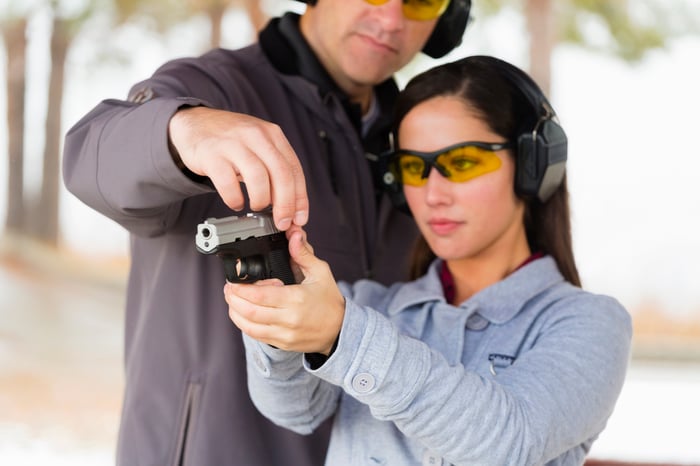Just as automakers aren't held liable for criminals driving cars while on a crime spree, the 2005 Protections of Lawful Commerce in Arms Act protects firearms manufacturers like Smith & Wesson Brands (SWBI -1.02%) and Sturm, Ruger (RGR -0.41%) from being held responsible for crimes committed with their products.
Gun control advocates, though, are exploring ways to do an end run around the law by using consumer protection laws to go after gunmakers, and the pursuit of Smith & Wesson in New Jersey may become the test case indicating whether the effort will be replicated across the country against all firearms companies.

Image source: Getty Images.
A roundabout means of attaching liability
Last October, Smith & Wesson was ordered by New Jersey's then-attorney general to turn over internal documents regarding its advertising that promoted personal safety through gun ownership. He alleged that by not offering up any proofs to back up its declarations or saying the state limits the ability of its citizens to carry a gun, the gunmaker was engaging in false advertising.
While that may seem like grasping at straws, it's the same legal strategy being pursued against the remnants of Remington Outdoor by the families of the Sandy Hook school shooting victims.
They're alleging the gunmaker violated Connecticut's consumer protection laws because it advertised its Bushmaster XM15 rifle, the gun used by Adam Lanza to shoot 20 children and six adults, as a "military-style" weapon. They contend the description and other marketing materials would make a troubled youth like Lanza more susceptible to choosing the AR-15-style rifle, which had been legally purchased by his mother.
Although Remington has since gone bankrupt and its assets were sold off, the lawsuit is still winding its way through the courts, and a trial is scheduled for next year.
Remington recently offered the families $33 million to settle the case, but their lawyers contend the wrongful death claims alone could total $225 million, and punitive damages could raise the total to over $1 billion.
While there are no wrongful death claims against Smith & Wesson yet, a successful lawsuit by New Jersey against the gunmaker could quickly spawn similar suits by crime victims in other states.

Image source: Getty Images.
Looking for a legal loophole
That's the threat facing Smith & Wesson, which fought the subpoena, arguing it was unconstitutional and an infringement on First Amendment rights. It said the maneuver was an attempt to undermine Second Amendment rights, but the New Jersey Supreme Court just summarily rejected the gunmaker's arguments, which means Smith & Wesson must turn over its documents to the AG's office.
New Jersey may be trying to backdoor its way around the federal liability protections gunmakers enjoy, as the former AG who issued the subpoena (he has since left to take over the enforcement division at the Securities & Exchange Commission) indicated he'd be looking to find a way around the law. "When I say that we need to be creative, this past fall I subpoenaed Smith & Wesson for documents relating to what I believe is their false advertising in New Jersey," he told a gun control roundtable panel this June.
The New York Times calls it "a Trojan horse to expose publicly, for the first time, the inner workings of the gun industry."
Others have also tried to creatively sidestep the law. Several years ago New York City's then-public advocate, Letitia James (who is New York's AG today), tried to have the SEC go after Smith & Wesson for failing to warn investors of the "grave reputational risk" it faced if its guns were used in mass shootings. That effort did not go anywhere.

Image source: Getty Image.
Firearms flying out the door
Gunmakers, though, don't really need to advertise their firearms all that much these days, as demand is outstripping supply.
Amid recent civil unrest the U.S. has faced, firearms are experiencing a rapid increase in demand. Consumers felt the need to protect themselves, their families, and their property, and the National Shooting Sports Foundation estimates 8.4 million Americans bought their very first gun in 2020.
Adjusted FBI background checks on potential gun buyers surged to a record 21.1 million last year, 59% more than in 2019 and 34% more than in 2016, the previous record year. Although background checks today are a little below last year's numbers, they remain elevated well above the rate two years ago and are some 6% ahead of 2016's level at the same point.
Last year was a record year for Smith & Wesson, as well. It reported revenue of $1.05 billion in fiscal 2021, almost double the $529 million it generated the year before, and generated $252 million in net income.
With some $113 million in cash available to it, the gunmaker's resources would be quickly depleted if it had to defend against multiple subpoenas and lawsuits, such as those Mexico just filed against 11 U.S. firearms manufacturers for gun violence perpetrated by drug cartels.
A heightened level of risk
New Jersey doesn't really need to find a "smoking gun" in Smith & Wesson's documents to achieve its goal since simply launching the effort could mark the start of a national effort to swamp gun manufacturers in steep legal costs.
That would make it difficult for even the most financially fit firearms company to survive, and this is likely the biggest threat Smith & Wesson Brands and the firearms industry now face, regardless of how this case is resolved.





